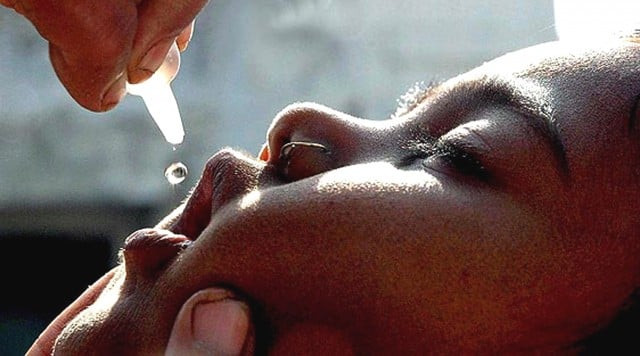Polio eradication: 107 campaigns on, here’s why our children are still crippled
Unicef warns that if it doesn’t succeed funding for other projects will sink.

At least 107 polio campaigns later, polio remains a threat to the children of Pakistan. In the four countries where the virus still circulates, Pakistan tops the list. India and Afghanistan had just one case so far this year and Nigeria had nine. But they all stand a much better chance of eradicating polio by the end of this year. In comparison, Pakistan has recorded 44 cases out of which 12 are from Sindh alone. The year hasn’t even ended yet.
The situation is a great cause of concern for foreign donors heavily invested in the eradication of polio. The World Health Organisation’s Dr Hussein A Gezairy, along with Unicef’s Dan Rohrmann and Health Minister Dr Sagheer Ahmed held a press conference on Thursday.
Deciding not to beat around the bush, Gezairy began with the obstacles. “There are many problems, we are aware of this. They range from some teams only existing on paper, known as ‘ghost teams’,” he said. “We also know that young children, seven or eight-year-olds, in some cases shabbily dressed, are being hired as vaccinators.” They also realise females are more welcomed into people’s homes than males. Still they are hopeful that if the on-ground implementation is improved and every child is reached, Pakistan can eradicate polio in the next two or three campaigns.
On the other hand, Ahmed said the only viable solution lay with a micro-management plan at the union council level. “If we adopt this strategy and achieve a 95 per cent of above coverage rate, we can eradicate polio in another 12 campaigns,” he said. The operational cost only (not including the vaccine) for each national campaign is $2.3 million.
“In May we managed to achieve a 97 per cent coverage rate and we will now not stop a sweeping [campaign] in any union council till a 95 per cent rate is achieved,” he said. “And if any council shows a routine immunisation (RI) lower than 80 per cent, funds will not be released to them.”
Presently, the routine immunisation rate for Sindh is lower than 65 per cent with the rate in the country dropping day by day, the minister added. When asked, Ahmed clarified that a 97 per cent coverage rate meant about 200,000 children were still missed. Ahmed suggested merging other national campaigns such as family planning, Maternal Newborn and Child Health with the Expanded Programme on Immunisation.
The focus was primarily on northern Sindh before this, Ahmed said, however when cases began to rise in the southern part of the province, attention was diverted there. “The last case was reported from SITE and before that Korangi [and] both [are] of locals from the northern part of Pakistan,” Ahmed said, adding that migration to the metropolis is one of the causes for the high incidence.
Gezairy compared the rest of the provinces to the Punjab where no case has been reported since the start of this year. “It is the same people and the same vaccine,” he said. “The difference is in the implementation of the programme.” In order to wrap up the loose ends, Gezairy said nine areas in Sindh, four in Karachi, have been identified as ‘high-risk zones’ and will be tackled more aggressively.
On the myths surrounding the doses and quality of vaccine, Gezairy said no harm would come to the child even if multiple doses were administered. The only exception was when a child was sick to the point of being admitted. “People have made up theories that the vaccines cause infertility, but this is absolutely not true. We were taken to court in Peshwar over this and while the WHO has diplomatic immunity, we still went ahead and proved otherwise,” he added.
Ahmed pointed to the lack of political will in supporting the eradication. According to him, many officials who fail to deliver are protected from the higher-ups rather than sacked or suspended. “Ownership implies saving children from polio, not officials from investigation,” he said clearly frustrated by political roadblocks. Gezairy, who met the governor prior to the briefing, supported Ahmed and called for greater political support. “Politicians need to realise this is a good political ticket. Clinton won the election talking on health issues. If a politician says he will eradicate polio and manages to achieve it, there is no better way to win the nation’s support.”
Gezairy warned that a sudden spike is cases will be witnessed in the coming weeks but there is no cause for alarm as they will decline soon, the aim was to keep them down and finish it off from there.
When asked about the consequences Pakistan will face in terms of aid from donor agencies if it did not manage to eradicate the disease, Unicef’s Rohrmann said, “If we do not see progress in the eradication if polio then other projects may also be impacted. This includes development projects as well.”
Published in The Express Tribune, June 3rd, 2011.


















COMMENTS
Comments are moderated and generally will be posted if they are on-topic and not abusive.
For more information, please see our Comments FAQ